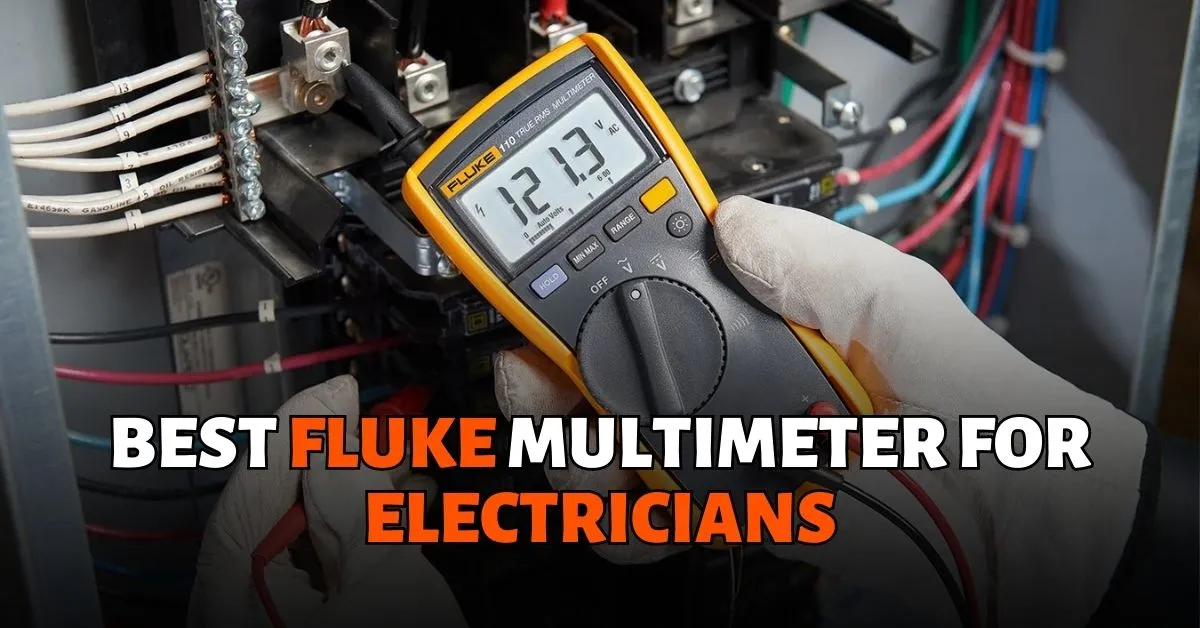As an experienced electrician, I’ve worked with many different multimeters throughout my career. I can tell you that not all multimeters are equal in accuracy, durability, and functionality. Fluke is the brand that consistently delivers the best performance in these areas.
I’m going to share my knowledge and expertise with you to help you find the best Fluke multimeter for your needs. Whether you are an experienced home electrician or just starting out, I’ll provide you with all the information you need to make an informed decision. Let’s get started!
- Fluke 117 Electricians True RMS Multimeter – Best Overall
- Fluke 87 V Digital Multimeter – Premium Choice
- Fluke 101 Digital Multimeter – Excellent Value
- Fluke 1587 Insulation Multimeter – Best for Insulation Testing
- Fluke 116 HVAC Multimeter – Best for HVAC Professionals
Factors to Consider When Choosing a Multimeter
When selecting the best Fluke multimeter for your needs, there are several factors to consider. These include:
1. Accuracy and Precision
Accurate measurements are paramount in the electrical field. Look for Fluke multimeters with high accuracy and precision to ensure reliable readings.
2. Safety Features
Electrical work can be hazardous, so prioritize multimeters with safety features such as CAT ratings, overvoltage protection, and fused current inputs.
3. Functionality and Features
Consider the specific functions and features you require. Fluke multimeters offer a range of options, including True-RMS, temperature measurement, data logging, and wireless connectivity.
4. Durability and Build Quality
As an electrician, your tools go through demanding environments. Choose a Fluke multimeter that can withstand the rigors of the job and is built to last.
5. User-Friendliness
Opt for a multimeter that is easy to use and navigate, with clear display screens and intuitive controls.
6. Budget
Consider your budgetary constraints while balancing the features and quality offered by the multimeter.
Best Fluke Multimeters Review
Let’s dive into the detailed reviews of each Fluke multimeter for electricians, starting with the best overall choice:
1. Fluke 117
#1 Best Overall
Fluke 117
- True RMS
- VoltAlert
- Low input impedance
- AutoVolt
- Backlight
- Min/Max/Average
- audible beep
- Auto power-off
- Measure various electrical parameters

I’ve used the Fluke 117 Electricians True RMS Multimeter, and it’s the best one I’ve ever tried. This little digital multimeter can do a lot of things electricians need, like measuring voltage, current, resistance, frequency, capacitance, and continuity accurately.
One great thing about the Fluke 117 is its True RMS calculation. It can measure AC voltage and current really accurately, even in tricky situations like with motors or lights. That means you can trust the readings it gives you. And the VoltAlert feature is awesome too. It lets you know if there’s voltage in a wire without touching it, which saves time and makes things safer.
I also like the AutoVolt feature. It figures out if it’s measuring AC or DC voltage on its own, so you don’t have to switch modes manually. That helps avoid mistakes. And the low-impedance mode stops false readings from ghost voltage, which can be a pain for electricians.
REASONS TO BUY
- Compact and ergonomic design
- Easy to use interface
- Reliable and accurate performance
- Automatic AC/DC voltage selection
- Versatile and convenient functions
- 3-year manufacturer warranty
REASONS TO AVOID
- Slightly pricier than others
2. Fluke 87V
#2 Premium Choice
Fluke 87V
- Excellent build quality
- Auto-ranging and manual ranging
- Warning beep
- Quick response times
- Low impedance
- Fast and responsive display
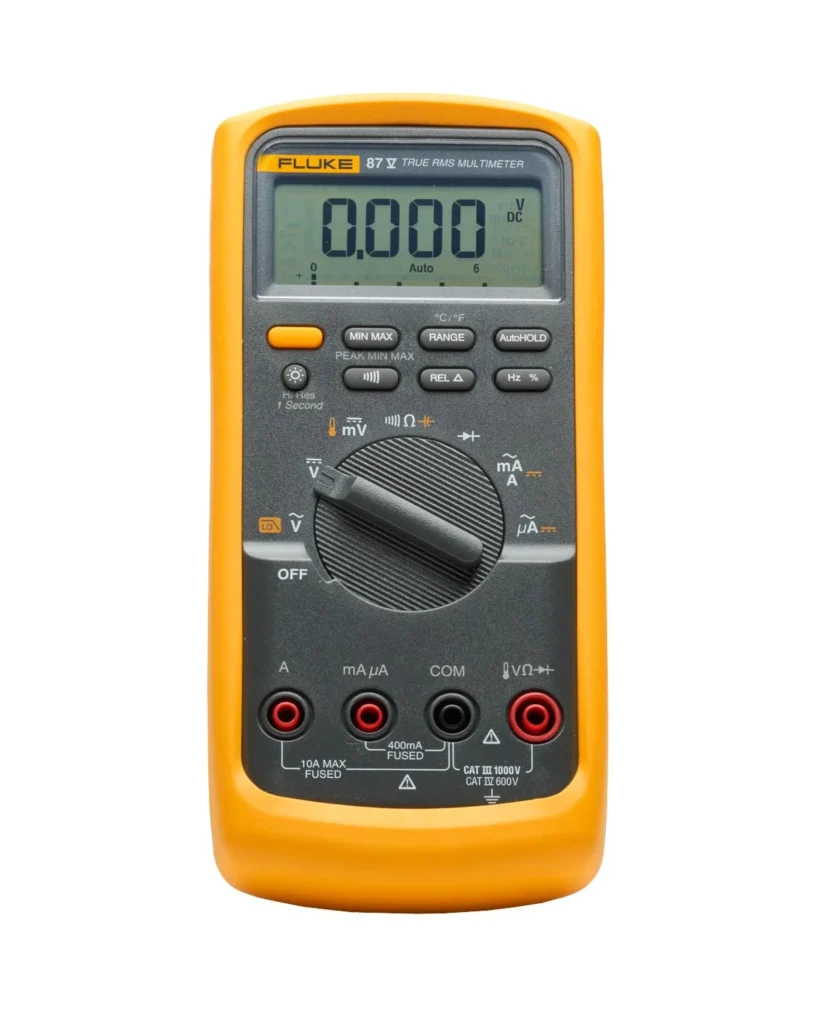
Perfect for pros like electronic techs and HVAC engineers who need a really accurate and reliable multimeter. I can see why it’s a top choice for electricians and technicians. It’s known for being tough, accurate, and reliable, perfect for fixing all sorts of electrical systems. Plus, it’s made in the USA, approved by lots of agencies, and designed to handle tough jobs in factories and other industrial places.
One cool thing about the Fluke 87-V is its display. It’s not huge, but it’s better than older versions. It shows numbers really quickly and clearly, even tiny changes in voltage. And there’s a bar graph that shows info really fast too. It can switch between auto-ranging and manual ranging, and it’s super fast at checking continuity.
It’s tough too, so it can handle being banged around a bit, but it does cost a lot more than basic multimeters. So, while it’s great for pros, beginners might find it a bit too fancy and expensive.
REASONS TO BUY
- Highly reliable and accurate
- Made in the USA and approved by various agencies
- Sturdy build that can handle physical abuse
- Quick response times and warning beep
REASONS TO AVOID
- The price may be steep for some users
- Best suited for electronic and HVAC engineers, not amateurs
3. Fluke 101
#3 Excellent Value
Fluke 101
- Basic DC accuracy 0.5%
- CAT III 600 V safety rated
- Diode and continuity test with buzzer
- Small lightweight design for one-handed use
- Rugged, durable design
- Automatic shutdown
- Battery is easy to replace
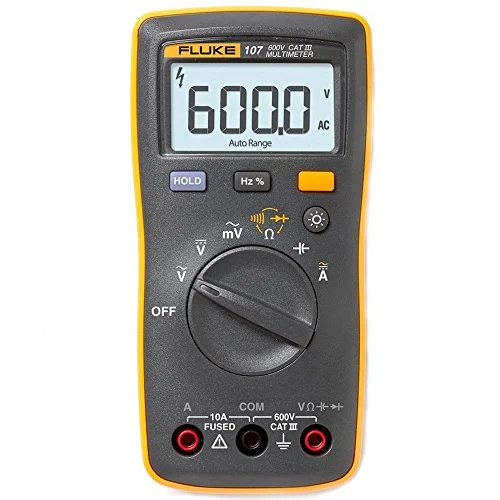
I’m pretty sure the Fluke 101 is a great deal for what you pay. It’s small enough to fit in your pocket and it’s good for all the basic electrical tests you might need to do, like checking resistance, voltage, and stuff like that. It doesn’t do milliamps or amps, but it still works well.
Just so you know, the Fluke 101 is made in Chinese factories to keep costs low, but it’s still safe and works great. The dial is easy to use with one hand, and it comes with standard plug leads, which is handy. It doesn’t have a stand, but you can buy a magnetic one if you want.
The only real downside is that it doesn’t have a light-up screen, so it might be hard to see in the dark. But the screen itself is really clear and has a high resolution. It’s got a safety rating of 600 volts, a battery life of 200 hours, and it can hold readings and turn off by itself, which is nice.
REASONS TO BUY
- Affordable
- Compact and lightweight
- Durable and sturdy build quality
- Automatic shutdown for improved battery life
- Quality build for the price
- Decent TL75 leads for its price
REASONS TO AVOID
- No CAT IV safety rating
- Test cables are awful
- No backlight
4. Fluke 1587 FC Insulation
#4 Best for Insulation
Fluke 1587 FC Insulation
- Measures insulation resistance (0.01 MΩ to 2 GΩ)
- Measures ac/dc voltage, current, resistance, continuity, capacitance, diode, temp, freq, and min/max.
- Has VFD low-pass filter and PI/DAR
- Large backlit display
- Compatible with Fluke Connect app
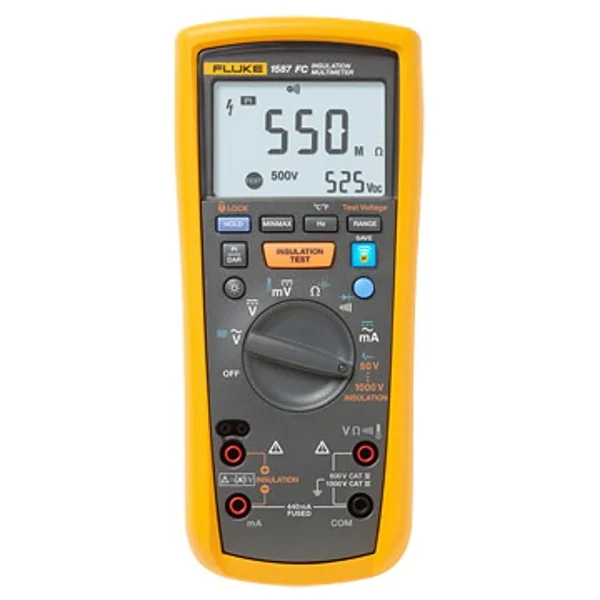
After looking around and getting advice from a friend who uses the Fluke 1587 Insulation Multimeter, I think it’s really impressive for measuring insulation and doing electrical tests. It’s great for electricians and other pros who deal with insulation a lot.
It’s got some cool features, like timed tests, live circuit detection, and a filter for motor measurements. It also discharges voltage from capacitors automatically for safety. And it can test insulation from small to big levels with different voltages.
But if you don’t need to test insulation, this might not be the right tool for you. And it does cost a bit more than other multimeters. But because it’s tough and dependable, it’s a good investment for people who need its special insulation testing features.
REASONS TO BUY
- Insulation resistance measurement (2 GΩ)
- Wireless connectivity (Fluke Connect)
- Backlit display, flashlight
- Various measurements (voltage, current, resistance, etc.)
- Low-pass filter
REASONS TO AVOID
- Expensive
- Separate batteries required
- No inductance/duty cycle measurement
5. Fluke 116 HVAC Multimeter
#5 Best for HVAC
Fluke 116 HVAC Multimeter
- HVAC thermometer
- Flame sensor testing (microamps)
- Low input impedance to prevent ghost voltage interference
- Large LED backlight for dimly lit areas
- Measurements: resistance, continuity, frequency, capacitance
- Min/Max/Average with elapsed time recording
- Compact ergonomic design
- Compatible with magnetic hanger for hands-free operation
- CAT III 600 V safety rating
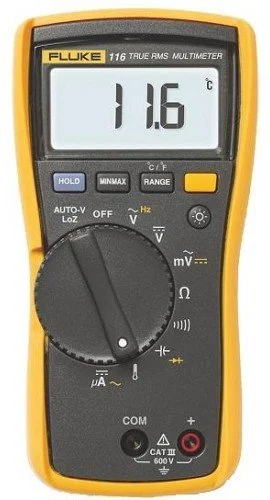
Let me level with you about the Fluke 116 HVAC Multimeter. It’s a great tool for HVAC experts, but there are a couple of things to consider. For one, the thermometer might not be super accurate, which can be annoying when you need precise readings. Also, you have to hold the readings manually, which can be a hassle. And it doesn’t measure amps on its own, so keep that in mind.
But hey, don’t let those small issues discourage you. The Fluke 116 is still a powerhouse for HVAC jobs. It can measure micro-amps, capacitance, frequency, and temperatures up to a blazing 400°C (752°F)! Plus, it’s super tough and reliable, so it can handle rough conditions like a champ.
Overall, even with its quirks, the Fluke 116 is still a top pick for HVAC experts. Just be aware that the auto-ranging can be slow, and manual ranging is faster.
REASONS TO BUY
- Built-in thermometer for HVAC applications
- Large backlit display
- Low input impedance to prevent false readings
- Microamp function for flame sensor currents
REASONS TO AVOID
- Measures microamps only, not amps
- Temperature readings can be misleading at times
- Only available in the USA
Final Verdict: Why I recommend Fluke 117
Alright, here’s my final take: the Fluke 117 is the one I recommend. I’ve checked out a bunch of Fluke multimeters for electricians, and after comparing all their features and testing them out, I’ve made up my mind.
It was a tough choice because each one had good things about it.
But after digging deep and thinking it over, I’m confident that the Fluke 117 is the best pick. It gives accurate readings with its True RMS technology, and it’s small enough to carry around easily. Plus, its LED screen lights up, so you can see it well even in dim places.
So, there you have it: the Fluke 117 is my top choice. It’s got great features and it’s well-built, so it’s worth the investment. But hey, don’t just take my word for it. Try it out yourself and see how it works for you. I bet you’ll be happy with it.

